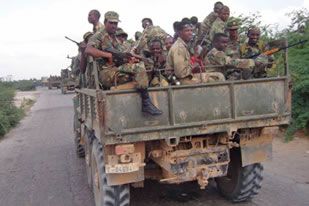
Saturday, June 20, 2009
Ethiopian troops have reportedly crossed into neighbouring Somalia after it made a plea for foreign troops to help it battle opposition fighters seeking to overthrow the government.

Ethiopian troops previously entered Soamlia in 2006 to drive out the Islamic Courts Union [File: EPA]
Somalia's parliamentary speaker made the request on Saturday after several days of heavy fighting in the north of the capital, Mogadishu.
"The government is weakened by the rebel forces. We ask neighbouring countries - including Kenya, Djibouti, Ethiopia and Yemen - to send troops to Somalia within 24 hours," Sheikh Aden Mohamed Nur, the Somali parliamentary speaker, said.
Ethiopian troops last entered Somalia in late 2006 to support the then-government and drive out Islamic Courts Union fighters led by Sharif Ahmed, the current president.
Border security
Al Jazeera's Mohammed Adow, reporting from Nairobi in Kenya, said that it remained to be seen what action Ethiopian forces would take.
"Ethiopia has got a big stake in what is going on in Somalia because it believes that its security would be threatened if the Islamist militais, such as al-Shabab, take over Somalia," he said.
"But I doubt it is sending its forces into Somalia, unless it gets its actions sanctioned by the United Nations, which would take weeks, if not months.
"Ethiopia's return to Somalia might be about securing its borders rather than heading to Mogadishu."
Nur said that it had been forced to call for help after the opposition fighters had been bolstered by hundreds of foreigners.
"We have a state of emergency in this country today because foreign fighters from all over the world are fighting the government," he said.
Nur also said that an al-Qaeda operative from Pakistan was directing the fighting and was based in the Sanna neighbourhood of Mogadishu, close to the presidential palace.
He did not provide any evidence for his claims.
Mohamed Sheikh Nor, a journalist in Mogadishu, told Al Jazeera that there was likely to be heavy fighting if the Ethiopian troops reached the central and southern areas controlled by the armed opposition groups.
"There will be confrontations and clashes," he said.
"Some of the politicians in the government say, however, that the Ethiopian troops can help set up the institutions of the government."
Al-Shabab and Hizbul Islam launched an offensive against government forces on May 7 and more than 300 civilians are believed to have been killed in the resulting fighting.
Heavy fighting
There were reports of heavy fighting on Saturday in Hamarweh, another suburb near the presidential palace, after clashes in the northern Karan district overnight.
"I saw heavily armed Islamist fighters advancing onto Hamarweh area. They are firing mortar shells and government forces are retaliating," Warsameh Ahmed, a Mogadishu resident, told the AFP news agency.
|
"Kenya had been saying that it will attack the mujahidin of al-Shabab for the last four months. If it tries to, we will attack Kenya and destroy the tall buildings of Nairobi" Sheikh Hasan Yacqub, |
"It seems they are to close to taking control of the area."
Three high-profile government officials - the security minister, an MP and a senior police officer - have been killed in recent days.
More than 4,300 Ugandan and Burundian soldiers are already deployed in Somalia as part of an African Union (AU) force and are charged with protecting strategic sites such as the presidency, the port and the airport.
But the troops are not allowed to fight alongside government forces and are only authorised to retaliate if they come under direct attack.
Kenya said on Friday that it would not sit by and allow the situation in its neighbour to deteriorate further as it would destabilise the rest of the region.
It said that the AU was committed to increasing its commitment, but al-Shabab had warned against any foreign intervention.
Sheikh Hasan Yacqub, an al-Shabab spokesman, said in the southern port city of Kismayo: "Kenya had been saying that it will attack the mujahidin of al-Shabab for the last four months.
"If it tries to, we will attack Kenya and destroy the tall buildings of Nairobi."
Thousands of residents fled Mogadishu on Saturday, many of them joining the estimated 400,000 people who are living rough along the Afgooye corridor, about 20km south of the capital.
400,000 people who are living rough along the Afgooye corridor, about 20km south of the capital.
| Source: | Al Jazeera and agencies |